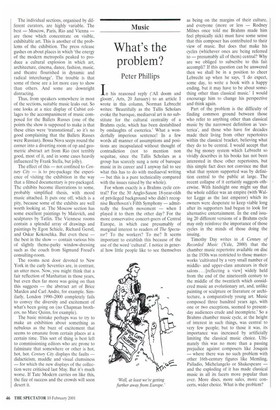Music
What's the problem?
Peter Phillips
In his reasoned reply CAR doom and gloom', Arts, 20 January) to an article I wrote in this column, Norman Lebrecht writes: 'Beautifully as the Tallis Scholars evoke the baroque, mediaeval art is no substitute for the cultural centrality of a Brahms cycle, which has been destabilised by onslaughts of esoterica.' What a wonderfully imperious sentence! In a few words all manner of assumptions and positions are incapsulated without thought of contradiction (not to mention non sequitae, since the Tallis Scholars as a group has scarcely sung a note of baroque music in its career and I anyway fail to see what this has to do with mediaeval writing — but this is a pure technicality compared with the issues raised by the whole).
For whom exactly is a Brahms cycle central? For the 30 Anglo-Saxon 18-year-olds of privileged background who didn't recognise Beethoven's Fifth Symphony — admittedly the fourth movement — when I played it to them the other day? For the more conservative concert-goers of Central Europe, in which case presumably of marginal interest to readers of The Spectator? To the workers? To me? It seems important to establish this because of the use of the word 'cultural'. I notice in general how little people like to see themselves as being on the margins of their culture, and everyone (more or less — Rodney Milnes once told me Brahms made him feel physically sick) must have some sense that this composer has contributed to their view of music. But does that make his cycles (whichever ones are being referred to — presumably all of them) central? Why are we obliged to subscribe to this fait accompli? If this question can be answered then we shall be in a position to cheer Lebrecht up when he says, 'I do expect, some day, to write a book with a happy ending, but it may have to be about something other than classical music.' I would encourage him to change his perspective and think again.
Part of the problem is the difficulty of finding common ground between those who refer to anything other than classical music by the narrowest definition as 'esoterica', and those who have for decades made their living from other repertoires within the classical bracket, believing what they do to be central. I would accept that the big money system which Ubrecht so vividly describes in his books has not been interested in these other repertoires, but this simple fact does not convince me that what that system supported was by definition central to the public at large. The recent collapse of it certainly suggests otherwise. With hindsight one might say that the whole edifice was an empire (with Walter Legge as the last emperor) which its owners were desperate to keep viable long after its supporters had begun to look for alternative entertainment. In the end issuing 20 different versions of a Brahms cycle may only reinforce the importance of those cycles in the minds of those doing the issuing.
Timothy Day writes in A Century of Recorded Music (Yale, 2000) that the chamber music repertoire available on disc in the 1930s was restricted to those masterworks 'cultivated by a very small number of middleand upper-class amateurs in their salons [reflecting a view] widely held from the end of the nineteenth century to the middle of the twentieth which considered music an evolutionary art, and, unlike painting or sculpture or literature or architecture, a comparatively young art. Music composed three hundred years ago, with one or two exceptions, seemed to presentday audiences crude and incomplete.' So a Brahms chamber music cycle, at the height of interest in such things, was central to very few people; but to those it was, its importance was increased by artificially limiting the classical music choice. Ultimately this was no more than a passing prejudice against composers like Josquin — where there was no such problem with other 16th-century figures like Mernling, Palladio, Michelangelo or Shakespeare — and the exploding of it has made classical music in all its facets more popular than ever. More discs, more sales, more concerts, wider choice. What is the problem?


































































 Previous page
Previous page